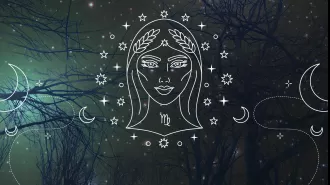Pregnant and seeing ghosts
I believed the afterlife was speaking to me through the music in the room.
December 28th 2024.

unusual beliefs – such as thinking you are the ‘chosen one’
extreme confusion
rapid mood swings
feeling elated or ‘high’
severe depression
difficulty speaking clearly
racing thoughts
paranoia
lack of need for sleep or inability to sleep
Postpartum psychosis is a serious mental illness that can occur in the hours, days, or weeks after giving birth. It affects about 1-2 in 1,000 births and can cause detachment from reality. I personally experienced this when my husband Chris and I were trying for a baby and I fell pregnant after a few months. We were both ecstatic and ready to become parents.
Everything was going well with my pregnancy until I reached the delivery suite. That's when things took an unexpected turn. I started seeing family members who had passed away standing around my bed, urging me to give birth to my son. It was a surreal experience, but what followed was even more unsettling.
I developed a strong belief that after my son was born, I would have to die. This thought consumed me and I panicked, telling my husband that I wasn't ready to die. That's when he realized that something was seriously wrong. We didn't know it at the time, but I was experiencing postpartum psychosis.
Postpartum psychosis is a serious mental illness that can cause detachment from reality. Its core symptoms include seeing or hearing things that others can't, having unusual beliefs, extreme confusion, rapid mood changes, racing thoughts, and lack of sleep. Before my diagnosis, I had never even heard of postpartum psychosis or experienced any mental health issues. But as I would come to learn, it can happen to anyone, even to those who have no history of mental illness.
It's worth noting that while those with bipolar disorder are more susceptible to developing postpartum psychosis, it can also occur out of the blue in people who have no prior experience with mental health problems. However, the good news is that with the right care, almost all women can recover from postpartum psychosis.
My delivery experience was far from what I had envisioned. I had planned for a calm and natural water birth, but after six hours of labor, I started having hallucinations. I saw and heard dead people and believed that the afterlife was communicating with me through the music in the room. My sister's favorite song played in the background, and I thought it was a sign that I would be joining her in the afterlife after giving birth. I even saw her standing at the foot of my bed, singing to me.
I was terrified and confused, and I shared everything with my husband. I truly believed what I was experiencing, and I thought I was being prepared for my journey into the afterlife. At the same time, I became agitated and started shouting at the midwives, which was out of character for me. My husband kept asking if this was normal, and the nurse assured him that it was not unusual for women to act strangely during labor due to the pain and trauma of giving birth.
After nine hours, I still hadn't progressed beyond 5cm, and my baby's heart rate began to drop, so I needed an emergency C-section. At that point, my mood shifted, and I became euphoric. I started shouting "happy" repeatedly, thinking it would lessen my pain and increase my chances of survival. I continued to shout as I was wheeled into the operating room. I remember hearing my baby cry and being placed on my chest, but I couldn't fully comprehend what was happening.
My postpartum psychosis only intensified after the C-section. I started telling the midwife that I wanted to die, and I was convinced that falling asleep meant I would never wake up again. I was determined to die in my own bed, so I discharged myself from the hospital against medical advice.
However, even at home, I couldn't sleep. I was filled with manic energy and a delusional fear of death. It wasn't until I was given sleeping pills that I finally slept, but even then, it was only for a few hours. This experience taught me that postpartum psychosis is a serious mental illness that should always be treated as a medical emergency. If you or someone you know is experiencing symptoms, seek help immediately.
delusions – thoughts or beliefs that are unlikely to be true
mania – feeling high, talking and thinking too much or too quickly, feeling ‘on top of the world’ or like you have lots of energy
low mood – showing signs of depression, being withdrawn or tearful, lacking energy, feeling numb or disconnected from your baby, having difficulty sleeping
loss of inhibitions – behaving in a way that is out of character and acting spontaneously
restlessness – pacing around or doing things constantly
confusion – feeling disorientated and experiencing difficulty concentrating and making decisions
Anxiety – feeling agitated, restless or afraid
paranoia – feeling like someone is trying to harm you or your baby
Thoughts of harming oneself or the baby
Postpartum psychosis can be a frightening experience for new parents. It is often described as a detachment from reality, where the person may see or hear things that others cannot, have unusual beliefs, and experience extreme confusion and rapid mood changes. For the person experiencing it, it can feel very real and overwhelming.
For the protagonist, her experience with postpartum psychosis began in the delivery suite, where she saw deceased family members around her, urging her to give birth. This triggered a strong belief that she would have to die after her son was born. She panicked and expressed her fears to her husband, who realized that something was seriously wrong.
At the time, neither of them had heard of postpartum psychosis, a serious postnatal mental illness that can occur in the hours, days, or weeks after giving birth. It can affect anyone, even those with no prior experience of mental health problems. In fact, it affects around 1-2 in every thousand births. The protagonist's experience with postpartum psychosis highlights the importance of awareness and understanding of this condition.
As she went into labor, the protagonist had envisioned a calm and controlled water birth, but her hallucinations and delusions started when she was 5cm dilated. She saw and heard dead people and believed that the afterlife was communicating with her through the music in the room. She also saw her late sister singing her favorite song, and believed that it was a sign that she would join her in the afterlife. This experience was very frightening and confusing for her, as she truly believed what she was seeing.
Her behavior also became erratic and out of character, causing her husband to question the staff if this was normal. The nurse reassured him that it is not uncommon for women to act strangely during labor, and they did not suspect any serious mental health issues at that point. However, after nine hours of no physical progress and her baby's heart rate dropping, the protagonist was rushed for an emergency C-section.
During the procedure, she became euphoric and started shouting "happy" repeatedly, believing that it would lessen her pain and increase her chances of survival. After giving birth, her psychosis only intensified. She told the midwife that she wanted to die and believed that she would never wake up if she fell asleep. Despite being given sleeping pills, she did not sleep for days due to a mixture of manic energy and the delusional fear of dying.
Postpartum psychosis can also manifest in symptoms such as anxiety, paranoia, and thoughts of harming oneself or the baby. For the protagonist, it was a terrifying and overwhelming experience, but with the right care, she was able to recover and be reunited with her son. Her story highlights the importance of seeking help and treatment for postpartum psychosis, as almost all women can recover with proper care.
It is crucial to raise awareness and understanding of postpartum psychosis to ensure that new parents receive the support and care they need. This condition is not a personal weakness or failure, and it can happen to anyone. By recognizing the symptoms and seeking help, we can ensure the well-being of new mothers and their families.
extreme confusion
rapid mood swings
feeling elated or ‘high’
severe depression
difficulty speaking clearly
racing thoughts
paranoia
lack of need for sleep or inability to sleep
Postpartum psychosis is a serious mental illness that can occur in the hours, days, or weeks after giving birth. It affects about 1-2 in 1,000 births and can cause detachment from reality. I personally experienced this when my husband Chris and I were trying for a baby and I fell pregnant after a few months. We were both ecstatic and ready to become parents.
Everything was going well with my pregnancy until I reached the delivery suite. That's when things took an unexpected turn. I started seeing family members who had passed away standing around my bed, urging me to give birth to my son. It was a surreal experience, but what followed was even more unsettling.
I developed a strong belief that after my son was born, I would have to die. This thought consumed me and I panicked, telling my husband that I wasn't ready to die. That's when he realized that something was seriously wrong. We didn't know it at the time, but I was experiencing postpartum psychosis.
Postpartum psychosis is a serious mental illness that can cause detachment from reality. Its core symptoms include seeing or hearing things that others can't, having unusual beliefs, extreme confusion, rapid mood changes, racing thoughts, and lack of sleep. Before my diagnosis, I had never even heard of postpartum psychosis or experienced any mental health issues. But as I would come to learn, it can happen to anyone, even to those who have no history of mental illness.
It's worth noting that while those with bipolar disorder are more susceptible to developing postpartum psychosis, it can also occur out of the blue in people who have no prior experience with mental health problems. However, the good news is that with the right care, almost all women can recover from postpartum psychosis.
My delivery experience was far from what I had envisioned. I had planned for a calm and natural water birth, but after six hours of labor, I started having hallucinations. I saw and heard dead people and believed that the afterlife was communicating with me through the music in the room. My sister's favorite song played in the background, and I thought it was a sign that I would be joining her in the afterlife after giving birth. I even saw her standing at the foot of my bed, singing to me.
I was terrified and confused, and I shared everything with my husband. I truly believed what I was experiencing, and I thought I was being prepared for my journey into the afterlife. At the same time, I became agitated and started shouting at the midwives, which was out of character for me. My husband kept asking if this was normal, and the nurse assured him that it was not unusual for women to act strangely during labor due to the pain and trauma of giving birth.
After nine hours, I still hadn't progressed beyond 5cm, and my baby's heart rate began to drop, so I needed an emergency C-section. At that point, my mood shifted, and I became euphoric. I started shouting "happy" repeatedly, thinking it would lessen my pain and increase my chances of survival. I continued to shout as I was wheeled into the operating room. I remember hearing my baby cry and being placed on my chest, but I couldn't fully comprehend what was happening.
My postpartum psychosis only intensified after the C-section. I started telling the midwife that I wanted to die, and I was convinced that falling asleep meant I would never wake up again. I was determined to die in my own bed, so I discharged myself from the hospital against medical advice.
However, even at home, I couldn't sleep. I was filled with manic energy and a delusional fear of death. It wasn't until I was given sleeping pills that I finally slept, but even then, it was only for a few hours. This experience taught me that postpartum psychosis is a serious mental illness that should always be treated as a medical emergency. If you or someone you know is experiencing symptoms, seek help immediately.
delusions – thoughts or beliefs that are unlikely to be true
mania – feeling high, talking and thinking too much or too quickly, feeling ‘on top of the world’ or like you have lots of energy
low mood – showing signs of depression, being withdrawn or tearful, lacking energy, feeling numb or disconnected from your baby, having difficulty sleeping
loss of inhibitions – behaving in a way that is out of character and acting spontaneously
restlessness – pacing around or doing things constantly
confusion – feeling disorientated and experiencing difficulty concentrating and making decisions
Anxiety – feeling agitated, restless or afraid
paranoia – feeling like someone is trying to harm you or your baby
Thoughts of harming oneself or the baby
Postpartum psychosis can be a frightening experience for new parents. It is often described as a detachment from reality, where the person may see or hear things that others cannot, have unusual beliefs, and experience extreme confusion and rapid mood changes. For the person experiencing it, it can feel very real and overwhelming.
For the protagonist, her experience with postpartum psychosis began in the delivery suite, where she saw deceased family members around her, urging her to give birth. This triggered a strong belief that she would have to die after her son was born. She panicked and expressed her fears to her husband, who realized that something was seriously wrong.
At the time, neither of them had heard of postpartum psychosis, a serious postnatal mental illness that can occur in the hours, days, or weeks after giving birth. It can affect anyone, even those with no prior experience of mental health problems. In fact, it affects around 1-2 in every thousand births. The protagonist's experience with postpartum psychosis highlights the importance of awareness and understanding of this condition.
As she went into labor, the protagonist had envisioned a calm and controlled water birth, but her hallucinations and delusions started when she was 5cm dilated. She saw and heard dead people and believed that the afterlife was communicating with her through the music in the room. She also saw her late sister singing her favorite song, and believed that it was a sign that she would join her in the afterlife. This experience was very frightening and confusing for her, as she truly believed what she was seeing.
Her behavior also became erratic and out of character, causing her husband to question the staff if this was normal. The nurse reassured him that it is not uncommon for women to act strangely during labor, and they did not suspect any serious mental health issues at that point. However, after nine hours of no physical progress and her baby's heart rate dropping, the protagonist was rushed for an emergency C-section.
During the procedure, she became euphoric and started shouting "happy" repeatedly, believing that it would lessen her pain and increase her chances of survival. After giving birth, her psychosis only intensified. She told the midwife that she wanted to die and believed that she would never wake up if she fell asleep. Despite being given sleeping pills, she did not sleep for days due to a mixture of manic energy and the delusional fear of dying.
Postpartum psychosis can also manifest in symptoms such as anxiety, paranoia, and thoughts of harming oneself or the baby. For the protagonist, it was a terrifying and overwhelming experience, but with the right care, she was able to recover and be reunited with her son. Her story highlights the importance of seeking help and treatment for postpartum psychosis, as almost all women can recover with proper care.
It is crucial to raise awareness and understanding of postpartum psychosis to ensure that new parents receive the support and care they need. This condition is not a personal weakness or failure, and it can happen to anyone. By recognizing the symptoms and seeking help, we can ensure the well-being of new mothers and their families.
[This article has been trending online recently and has been generated with AI. Your feed is customized.]
[Generative AI is experimental.]
0
0
Submit Comment





